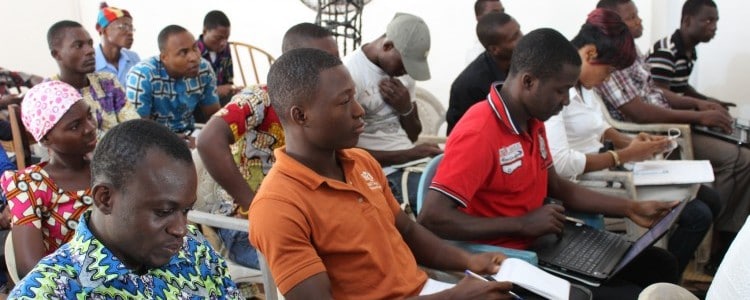
Today’s demographically ‘youthful’ Africa demands policies that promote full productive and decent work that expands young people’s life prospects, while ensuring their countries’ long-term development. Interventions to provide young people with entrepreneurial and other skills must be accompanied by strategies to restructure economies to create viable jobs for young people.
Africa is a ‘youthful’ continent. In 2015, the number of African youth aged 15–24 years was estimated at 229.6 million, or 19.4% of the total population, with the 486 million children under 15 years making up another 40.9%. Moreover, unlike in other parts of the world where youth populations have plateaued or are in decline, the proportion of youth in Africa is expected to continue to rise in the coming decade. Thus, if only because of their numerical strength, young people’s choices, opportunities and challenges will be crucial in shaping the future of their countries. This fact has been brought into sharp relief by recent youth-led movements in Tunisia, Egypt, Burkina Faso and South Africa, which have had, for better or worse, profound political, economic and social consequences.
Youth employment challenges in Sub-Saharan Africa
A pressing question for policymakers is how to productively occupy the cadres of young people on the continent. For young people, employment is the primary avenue of successful transition into adulthood, which is socially marked by economic independence, marriage and the raising of a family. At the same time, youth employment is also important for nations, which must find ways to harness the potential of young people for development, or risk having them become a disruptive force.
In 2014, youth labour force participation – the proportion of the working-age population who participate in the labour market, whether employed or unemployed and looking for work – was 54.3% for Sub-Saharan Africa and 33.7% for North Africa, compared to a global level of 47.3%. These figures tell us that there are high proportions of African youth of working age either with jobs or looking for jobs. On the flip side, employment statistics suggests higher proportions of youth than adults in the categories of unemployed, underemployed and the working poor, with young women being more vulnerable.
Jobless growth
But, what accounts for the unfavourable employment situation of African youth? One important explanation is the phenomenon of jobless growth. African economies have grown at a steady rate in the past decade, but job creation has not kept pace. A consequence is that many workers (as high as 80% in some countries), and predominantly women, are absorbed by the informal economy, within which work is precarious and poverty levels high. Even when young people find work, they are less likely than adults to be engaged in full and productive work under acceptable conditions characterized by good wages, job security and a safe working environment.
Skills mismatch
A second explanation offered for young people’s disproportionately high rates of unemployment and underemployment is the mismatch between the skills young people have to offer and those needed by the job market. Skills mismatch in Africa is most commonly a problem of under-education, but can also be due to young people being over-qualified for available jobs, which explains the unduly high unemployment rates among university graduates, especially in North African countries. Skills mismatch is also the consequence of not having the right type of education, where young people do not acquire the ‘hard’ (technical) and ‘soft’ (socio-emotional and cognitive) skills needed by the market.
The lack of adequate technical skills is indicated by disproportionately low enrolments in programmes demanded by employers, such as those that provide vocational, artisanal, entrepreneurial and scientific training. Research also shows that young people are more disadvantaged than adults in the knowledge and resources needed to search for, negotiate and maintain work. These soft skills can be critical in the initial transition from school to work, a process which is longest for young people in Sub-Saharan Africa than in any other region. Moreover, the inability of young people to obtain decent work early can affect their prospects of finding productive employment later in life.
Policy recommendations:
The International Labour Conference in June 2012 adopted a ‘call for action’ that sets out five priority policy areas to address youth employment challenges. These are job creation, education and training to support the school-to-work transition, targeted interventions for disadvantaged youth, entrepreneurship training, and the enforcement of labour rights. Based on this, I offer three recommendations that are of particular importance in the African context.
- Develop policies to increase skills training: First, there is pressing need for policies that support young people to develop the skills appropriate to the job market. Included in such policies would be interventions to overhaul school curricula to be less theoretical and more practical, to offer internships and other opportunities for work, and to provide training (whether in-school or on-the-job) to young people to enable them to better navigate the labour market.
- Provide entrepreneurship training: Another policy solution is entrepreneurship training, i.e. giving young people the skills to create jobs for themselves and for others. However, this approach does not solve the underlying structural problems that lead to unemployment and it may be unfair to expect young people to be able to make something of their lives on the basis of a little training and perhaps a little credit.
- Undertake economic restructuring for employment-led growth: A necessary complementary course of action is for African governments to oversee economic restructuring for employment-led growth that expands sectors, such as manufacturing and modernized agriculture, to provide opportunities for either employment or self-employment for young people.










